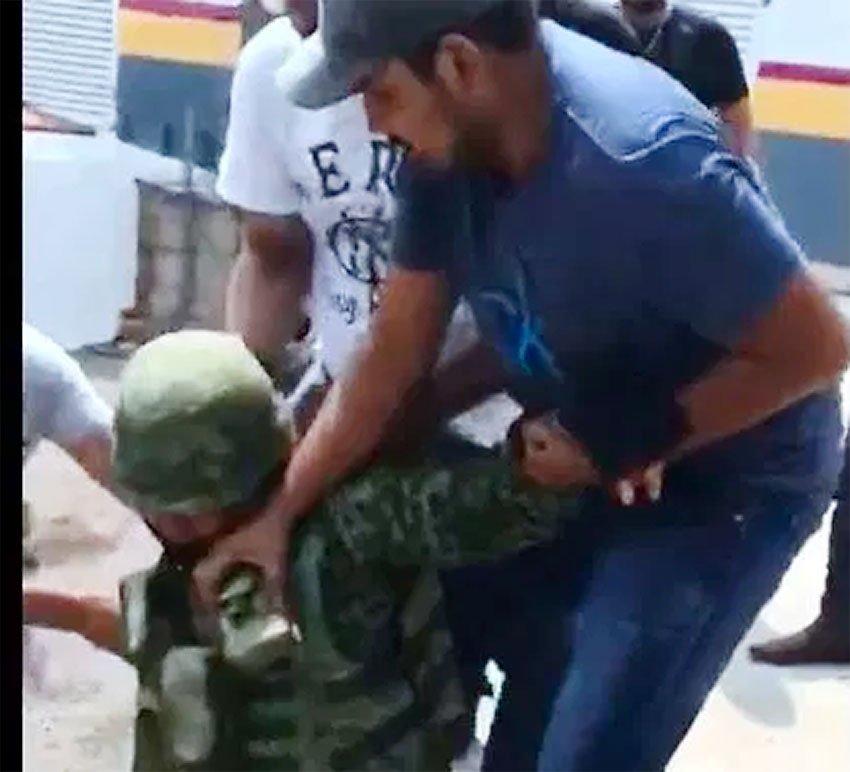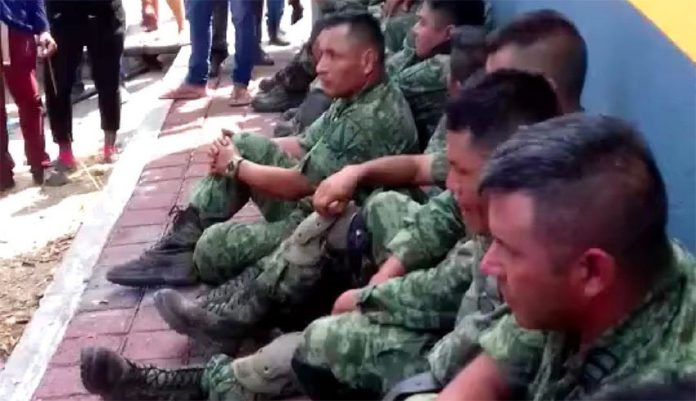The Jalisco New Generation Cartel (CJNG) led the disarmament and detainment of 14 soldiers in La Huacana, Michoacán, last month, according to intelligence reports.
Three people with close links to Miguel Ángel Gallegos Godoy – “El Migueladas” – alleged leader of the CJNG in La Huacana, led the May 26 aggression, the newspaper Milenio reported today.
The soldiers were besieged by a large group of people who demanded the return of weapons the army seized earlier in the day after two separate confrontations with armed men. Two civilians were killed in the first clash and a young boy was wounded in the second.
Videos posted to social media show the aggressors, identified in subsequent reports as members of a self-defense force, pushing and disarming the 14 soldiers, who put up little resistance. The incident has been widely described as a humiliation for the armed forces.
Military intelligence reports obtained by Milenio identify Gaudencio Lozano Barriga, Bulmaro Arzate Fierro and Maricruz Ramírez as instigators of the attack.

Lozano, also known as “El Gaudi,” is a deputy to Gallegos in the local power structure of the CJNG, according to the military reports.
Arzate is a hired gun for the CJNG and part of Gallegos’ inner circle while Ramírez is believed to be in a relationship with Francisco Tavares, a right-hand man of the La Huacana capo.
While the soldiers were detained, General Gerardo Mérida and other army personnel attempted to enter La Huacana in military pickups but were prevented from doing so because a truck was parked across the road leading into the town.
A group of around 50 people, some armed with large sticks, demanded that the general get out of his vehicle but he refused after which at least two men began to attack the pickup.
Another soldier was detained during the incident but Mérida and the other army personnel he was traveling with managed to escape.
According to the military reports, one of the 14 soldiers detained in La Huacana then called General Mérida before handing over his telephone to Lozano.
In video footage, the suspected CJNG member is heard demanding the return of the confiscated weapons, which included two AK-47s, an R-15 and a Barrett rifle.
“Hey, boss, I want all the weapons, I want you to send them in a private car to La Huacana, please. We’re the people, we’re not armed people,” El Gaudi shouts.
“In whose name do I send them?” Mérida inquires.
“In the name of the people, send them in the name of the people,” Lozano responds before sending three men to receive the weapons at the entrance to the town.
Lozano and Arzate fled La Huacana hours after the events of May 26, according to army commanders. The 14 soldiers were released six hours after they were detained in exchange for the confiscated, high-caliber weapons.
Eight of the soldiers were summoned by the federal Attorney General’s Office yesterday to make statements about their ordeal.
After their detainment, President López Obrador praised the soldiers’ conduct, stating that their attitude “was very responsible, very honorable and very brave” and that “prudence is much better than authoritarianism.”
The CJNG is considered Mexico’s most powerful and dangerous cartel but statistics show that very few of its members have been arrested and prosecuted in recent years.
Source: Milenio (sp)
